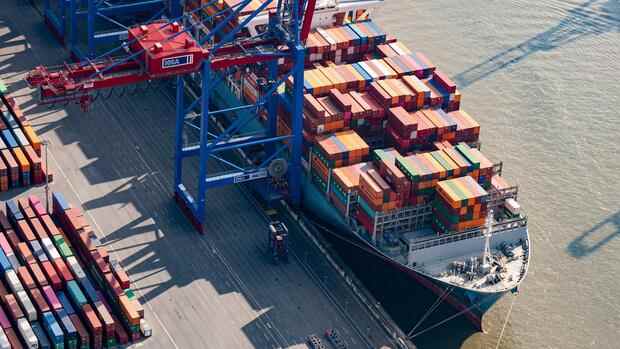Significantly fewer goods are now being delivered to Russia.
(Photo: dpa)
Dusseldorf The volume of deliveries of goods to Russia continues to shrink, and at a rapid pace. After shipments to the country fell by 16 percent worldwide last week, the drop since the outbreak of war is now 62 percent. The US supply chain specialist Fourkites, who works for corporations such as Coca-Cola, Walmart and Henkel, calculated this on Wednesday.
Industry is primarily responsible for the fact that imports to Russia have almost come to a standstill. The supply chain specialist puts the decline caused by companies such as Siemens Energy, Volkswagen, BMW and Daimler Truck at 65 percent.
The effect is somewhat smaller for consumer goods. Western manufacturers such as Adidas, Nike, Apple, Ikea and Obi have closed their business in Russia. Here, according to Fourkites, the decline in goods deliveries was 60 percent.
The reason for this may not least be the sanctions that the European Union is threatening companies that favor pro-government oligarchs with Russian imports. In the case of misconduct, the EU offers fines of ten million euros and imprisonment of up to five years.
Top jobs of the day
Find the best jobs now and
be notified by email.
This makes trade considerably more difficult, reports Lothar Harings, sanctions expert and lawyer at the Graf von Westphalen law firm. “Companies need to be sure that their Russian contractual partner is not controlled by a listed person,” he describes the high hurdles.
Deliveries to the warring country have collapsed by 62 percent worldwide.
(Photo: dpa)
In any case, the management must be shown the shareholder structure before the deliveries are made. If a listed oligarch or a listed company holds more than half of the shares, a prohibited “indirect supply” is assumed for deliveries.
Business for German exporters to Russia in particular is made even more difficult by the fact that the Federal Ministry of Economics and Technology has suspended the Hermes guarantees for the warring country. The Federal Republic of Germany has been using export credit guarantees since 1949 to protect exports from German companies against the insolvency of foreign customers, but also against the consequences of war or state confiscation. The ban on guarantees is now ruining business in Russia, especially for medium-sized companies that lack a lavish financial buffer.
Freight rates are falling again
On the other hand, the situation for German importers is surprisingly easing at the moment, as freight rates are falling across the board. For the first time since July 2021, the London-based sea freight consultancy Drewry reported, the average rate per double container fell below the $9,000 mark at the end of last week. Compared to the previous week, the average price fell by 3.8 percent to $8,832 after price reductions had already occurred in the two weeks before.
Experts are amazed at this development. Because many had expected an additional price boost. The halting rail freight connection between China and Europe, which has hardly been booked since the outbreak of the Ukraine war, gave cause for concern.
>> Read also: Freight forwarders complain about high diesel prices: “Consider whether we shouldn’t just leave the vehicles where they are”
Only a few trains are currently leaving the Middle Kingdom. Chinese shippers are concerned about the safety of the goods, while western importers fear boycotts and sanctions because they use the Russian railway company RZD for transport.
Kuehne + Nagel manager Marcus Balzereit announced to the industry service “The Edge Markets” that he would no longer accept bookings for the rail connection. For urgent shipments, the Swiss logistics company now recommends a combination of air and sea freight instead.
However, should the so-called Iron Silk Road come to a complete standstill, the latter would have to accommodate an additional 1.46 million standard containers (TEU) per year – and thus four percent of the steel boxes available worldwide. In particular, loads from the computer supplier Dell, the furniture retailer Ikea or the car company Toyota, which have relied heavily on the almost 12,000-kilometer rail connection in recent years, now also have to be transported on the ship.
Navigation in the Black Sea almost completely stopped
At least in the ports of western and northern Europe, this has so far hardly led to any major delays. The average dwell time for imported goods there is around eight days – just four percent longer than when the Ukraine war broke out.
The situation in Southern and Eastern Europe is completely different. After at least five freighters in the Black Sea were fired upon by artillery in the past few weeks, seafaring there has come to an almost complete standstill. The port of Odessa, Ukraine’s largest port, is closed. In Berdyansk, Russian tugboats towed five foreign wheat freighters to make room for their own warships.
Accordingly, the ships are diverted to other ports, especially to Italy and Greece, where the first traffic jams are now becoming apparent. In Southern and Eastern Europe, Fourkites calculates that container loading now takes almost eleven days – four days more than just before the outbreak of war.
More: Delivery routes to Russia are collapsing – ships are backing up in Europe’s ports
